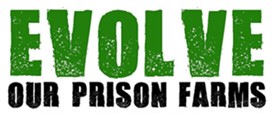Media Release
1 March 2018
A CONTROVERSIAL FUTURE FOR PRISON FARMS
KINGSTON, ONTARIO – While some advocates are applauding the federal budget commitment of $4.3 million to reopen the agricultural operations at Collins Bay and Joyceville Institutions in Kingston, other proponents of prison farms received the news with a mixture of optimism and apprehension.
For two years, the Kingston-based community coalition Evolve Our Prison Farms has campaigned for the restoration of prison farms in the form of plant-based agriculture and farmed animal sanctuary as an environmentally sustainable, compassion-based alternative to the former model of dairy, meat and egg production.
These prison farm advocates recognize animal agriculture as deeply problematic: devastating to the environment, detrimental to human health, and in the context of prisons, counterproductive to rehabilitation. Since 2016, Evolve Our Prison Farms has put forward an evidence-based case, supported by experts in criminology, law, climate change, and interpersonal and animal abuse.
Recent media reports have suggested that not only will animal agriculture return, but it will be intensified, with more animal involvement than before. According to Jeff Peters, a member of the Pen Herd Co-Op, the farms will produce artisan cheese to feed to prisoners, as well as adding pigs and chickens. (Before the farms were shut down in 2011, there were an estimated 10,000 chickens at Collins Bay Institution – nearing factory farm level.)
Corrections Canada has indicated that multiple models are under consideration and that no decision has yet been made on what form the farms will take.
There is overwhelming evidence that objectifying animals and learning to harden one’s response to their pain and suffering leads to general diminishment of empathy and a greater propensity to engage in violence. Basing rehabilitation on an exploitative model of human use of animals is inherently contradictory, whereas sanctuary allows for genuinely humane and therapeutic human-animal relationships.
Recently, Evolve Our Prison Farms conducted a survey of 128 prisoners across Canada. Only 30% of respondents selected dairy as their top choice for prison farms, with 70% favouring sanctuary and/or plant-based agriculture.
One prisoner at Joyceville Institution commented: “I personally could not be present in any area where animals are being killed. I have suffered a trauma so profound because of the offense I committed that just the thought of seeing any living thing die is unthinkable to me.”
It is imperative that the government make a decision about the prison farms based on evidence and sound public policy. A modest policy pivot towards plant-based farms and sanctuary is the right decision, and would gain widespread public support.
Otherwise, if animal agriculture is returned to Kingston’s prison farms, the community will rally to oppose it, and the government may find itself facing another long drawn out battle against a dedicated and passionate group of prison farm advocates.
– 30 –
